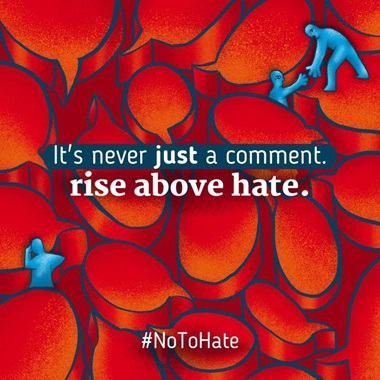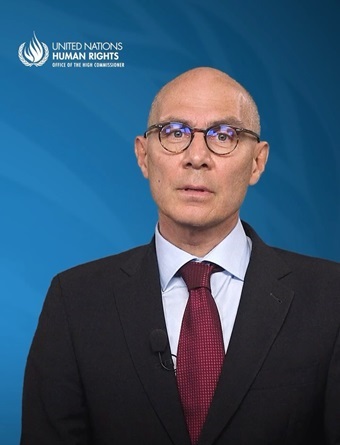
From the UN page devoted to fighting hate speech.
Hate speech – and reactions to hate speech – confront us, in Vancouver, across Canada and around the world.
Following is an introduction to a timely and relevant report by Janet Epp Buckingham, followed by two excerpts.
On 30 October 2023, the World Evangelical Alliance [WEA] submitted a report to the United Nations Special Rapporteur on freedom of religion or belief in response to the Special Rapporteur’s call for input on ‘Advocacy of Hatred Based on Religion or Belief – Transformative Responses.’
In our report, we address the paradox of the rise of hatred targeting religious minorities and the adverse impact that anti-hate legislation can have on legitimate religious expression.
Among the recommendations, the report urges the Special Rapporteur to continue to call out governments that incite hatred against religious minorities and to repeal blasphemy laws in their countries, to encourage global religious bodies to speak against promotion of hatred by those in their religious tradition, and to encourage Western countries to include exemptions for religious expression in their hate speech prohibitions.
1. Introduction

“UN Human Rights Chief Volker Türk strongly deplored the sharp rise in hatred globally – including anti-Semitism and Islamophobia – since 7 October, while at the same time expressing concerns about undue restrictions on protests over the conflict in Israel and Gaza, and related free expression.” (UN press release November 4)
We wish to thank the Special Rapporteur for addressing the important issue of hate speech in relation to freedom of religion or belief. In this submission, we show how hate speech is often used to target and marginalize religious minorities. We make a number of recommendations, which we hope will assist the Special Rapporteur in addressing her mandate.
The World Evangelical Alliance (WEA), established in 1846, represents some 600 million evangelical Christians worldwide. These Christians live in a wide range of circumstances. Some live where Christians are in a majority and where government policy may reflect that reality. Others live in secret under government regimes where it is illegal to practice their faith.
It is therefore difficult to make generalizations about their collective experience of hatred. However, we would like to take the opportunity to respond to this call for input and illustrate the complexity of the issues.
The WEA has long addressed issues of religious freedom. We have identified a pattern that leads up to outright persecution. This pattern generally starts with disinformation and hate speech. Once the society accepts the disinformation and spread of hatred towards the religious group, policies of discrimination are facilitated. Discrimination is then followed by persecution. Clearly, hate speech can be dangerous for those it targets.
On the other hand, we are currently witnessing a trend among states, particularly in the West, of instituting increasingly strict laws restricting free speech on the grounds that it could constitute hate speech. For evangelical Christians, this causes concern when the restrictions prohibit legitimate religious beliefs, particularly about the sanctity of life and human sexuality.
Although courts have upheld the right to religious expression thus far, the fact that some Christian leaders have faced criminal trials for publicly expressing religious views is concerning.
In this submission, we address the paradox of the rise of hatred targeting religious minorities and the adverse impact that anti-hate legislation can have on legitimate religious expression. We end our observations with how this is playing out in real time in the current crisis in the Holy Land.
4. Hate speech in the context of the current Middle East conflict
Since the 7 October 2023 attack on Israel by Hamas and the ensuing siege and bombing of Gaza, hate speech, including genocidal discourse, on social media as well as by politicians, media and social influencers spiked all over the world with real world consequences. In Canada, Jews have been targeted by violent protests, including one at a Jewish school. In the United States, a six year old Palestinian-American was killed by his neighbor.
It is bad enough that those in Israel and Gaza are in fear for their lives, but the fact that Jews and Palestinians living elsewhere are also at risk shows the power of hate speech.
Recommendation 5: We urge that the Special Rapporteur to publicly recognize the role of the spread of hate speech in fueling the ongoing conflict in the Middle East and the ensuing violence around the world, particularly as it endangers Jews and Palestinians all over the world.
Go here for the full report. The other sections are:
2. Hatred targeting religious minorities
3. Restrictions on hate speech that limit FORB
5. Final comments

Janet Epp Buckingham
Dr. Janet Epp Buckingham is Director of Global Advocacy for the WEA. She is also Executive Editor of the International Journal for Religious Freedom, the flagship publication of the International Institute for Religious Freedom, and Co-Director of the IIRF (Vancouver).
She was until last year a Professor of Political Studies at Trinity Western University with a research focus on religious freedom law in Canada and internationally. She has a doctorate in Public Law from the University of Stellenbosch, South Africa.
To support Janet in her WEA work, please go to: https://www.
The provincial government released this statement November 15: Government taking action to protect communities against hate, violence.
